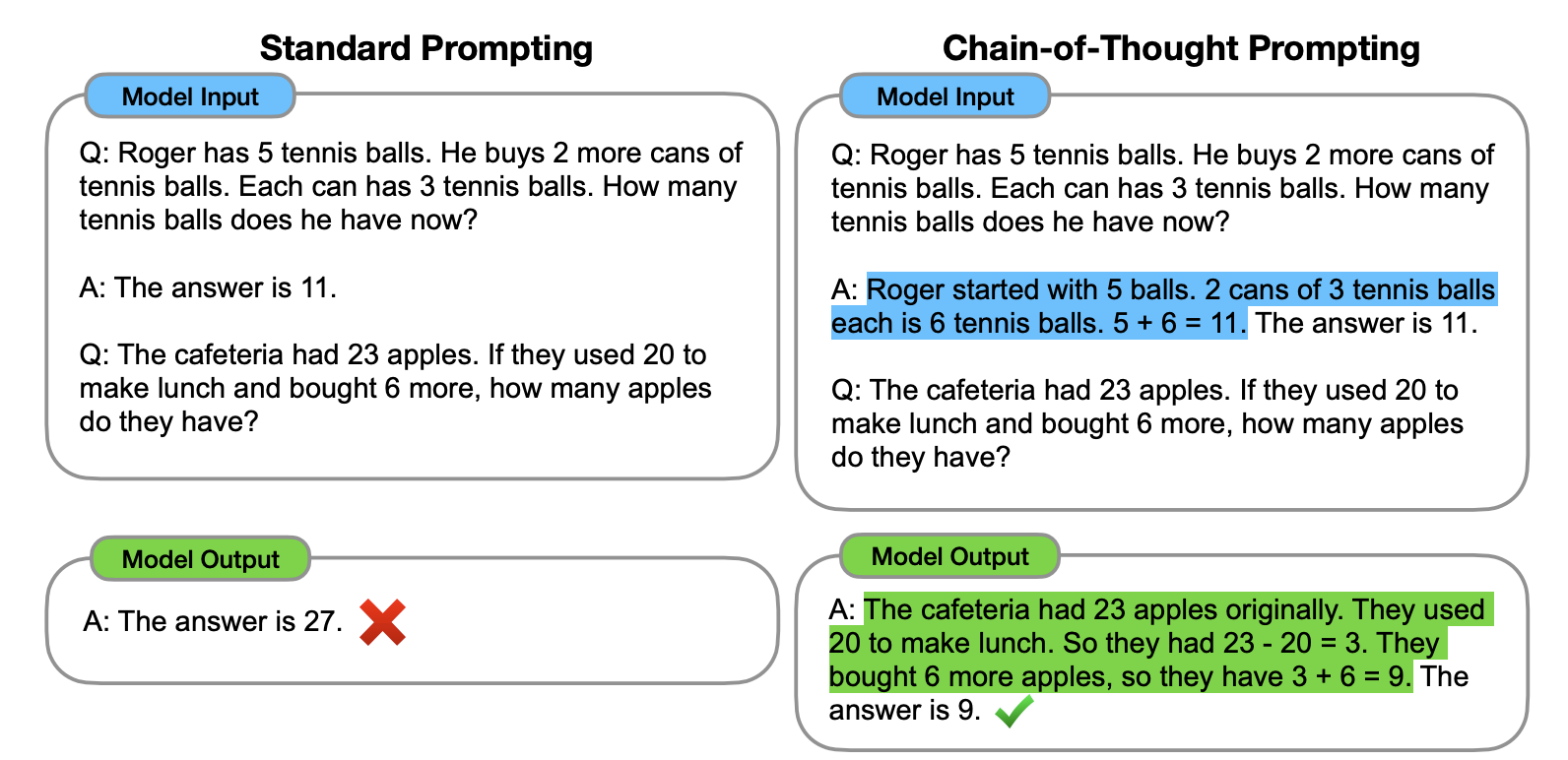介绍
我们在技巧2 中,提到我们可以给模型一些示例,从而让模型返回更符合我们需求的答案。这个技巧其实使用了一个叫 Few-Shot 的方法。
这个方法最早是 Brown 等人在 2020 年发现的,论文里有一个这样的例子,非常有意思,通过这个例子你应该更能体会,像 ChatGPT 这类统计语言模型,其实并不懂意思,只是懂概率 😁
Brown 输入的内容是这样的(whatpu 和 farduddle 其实根本不存在):
A "whatpu" is a small, furry animal native to Tanzania. An example of a sentence that uses
the word whatpu is:
We were traveling in Africa and we saw these very cute whatpus.
To do a "farduddle" means to jump up and down really fast. An example of a sentence that uses
the word farduddle is:
Output 是这样的:
When we won the game, we all started to farduddle in celebration.
不过这并不代表,Few-Shot 就没有缺陷,我们试试下面这个例子:
Prompt:
The odd numbers in this group add up to an even number: 4, 8, 9, 15, 12, 2, 1.
A: The answer is False.
The odd numbers in this group add up to an even number: 17, 10, 19, 4, 8, 12, 24.
A: The answer is True.
The odd numbers in this group add up to an even number: 16, 11, 14, 4, 8, 13, 24.
A: The answer is True.
The odd numbers in this group add up to an even number: 17, 9, 10, 12, 13, 4, 2.
A: The answer is False.
The odd numbers in this group add up to an even number: 15, 32, 5, 13, 82, 7, 1.
A:
Output 是这样的:
The answer is True.
输出的答案其实是错误的,实际上的答案应该是:
Adding all the odd numbers (15, 5, 13, 7, 1) gives 41. The answer is False.
那我们有没有什么方法解决?
技巧8:Few-Shot Chain of Thought
要解决这个缺陷,就要使用到新的技巧,Few-Shot Chain of Thought。
根据 Wei 他们团队在 2022 年的研究表明:
通过向大语言模型展示一些少量的样例,并在样例中解释推理过程,大语言模型在回答提示时也会显示推理过程。这种推理的解释往往会引导出更准确的结果。
下面是论文里的案例,使用方法很简单,在技巧2 的基础上,再将逻辑过程告知给模型即可。从下面这个案例里,你可以看到加入解释后,输出的结果就正确了。

那本章开头提的例子就应该是这样的(注:本例子同样来自 Wei 团队论文):
The odd numbers in this group add up to an even number: 4, 8, 9, 15, 12, 2, 1.
A: Adding all the odd numbers (9, 15, 1) gives 25. The answer is False.
The odd numbers in this group add up to an even number: 17, 10, 19, 4, 8, 12, 24.
A: Adding all the odd numbers (17, 19) gives 36. The answer is True.
The odd numbers in this group add up to an even number: 16, 11, 14, 4, 8, 13, 24.
A: Adding all the odd numbers (11, 13) gives 24. The answer is True.
The odd numbers in this group add up to an even number: 17, 9, 10, 12, 13, 4, 2.
A: Adding all the odd numbers (17, 9, 13) gives 39. The answer is False.
The odd numbers in this group add up to an even number: 15, 32, 5, 13, 82, 7, 1.
A:
聊完技巧,我们再结合前面的 Zero-Shot Chain of Thought,来聊聊 Chain of Thought 的关键知识。根据 Sewon Min 等人在 2022 年的研究 表明,思维链有以下特点:
- “the label space and the distribution of the input text specified by the demonstrations are both key (regardless of whether the labels are correct for individual inputs)” 标签空间和输入文本的分布都是关键因素(无论这些标签是否正确)。
- the format you use also plays a key role in performance, even if you just use random labels, this is much better than no labels at all. 即使只是使用随机标签,使用适当的格式也能提高性能。
理解起来有点难,我找一个 prompt 案例给大家解释(🆘 如果你有更好的解释,不妨反馈给我)。我给 ChatGPT 一些不一定准确的例子:
I loved the new Batman movie! // Negative
This is bad // Positive
This is good // Negative
What a good show! //
Output 是这样的:
Positive
在上述的案例里,每一行,我都写了一句话和一个情感词,并用 // 分开,但我给这些句子都标记了错误的答案,比如第一句其实应该是 Positive 才对。但:
- 即使我给内容打的标签是错误的(比如第一句话,其实应该是 Positive),对于模型来说,它仍然会知道需要输出什么东西。 换句话说,模型知道 // 划线后要输出一个衡量该句子表达何种感情的词(Positive or Negative)。这就是前面论文里 #1 提到的,即使我给的标签是错误的,或者换句话说,是否基于事实,并不重要。标签和输入的文本,以及格式才是关键因素。
- 只要给了示例,即使随机的标签,对于模型生成结果来说,都是有帮助的。这就是前面论文里 #2 提到的内容。
最后,需要记住,思维链仅在使用大于等于 100B 参数的模型时,才会生效。